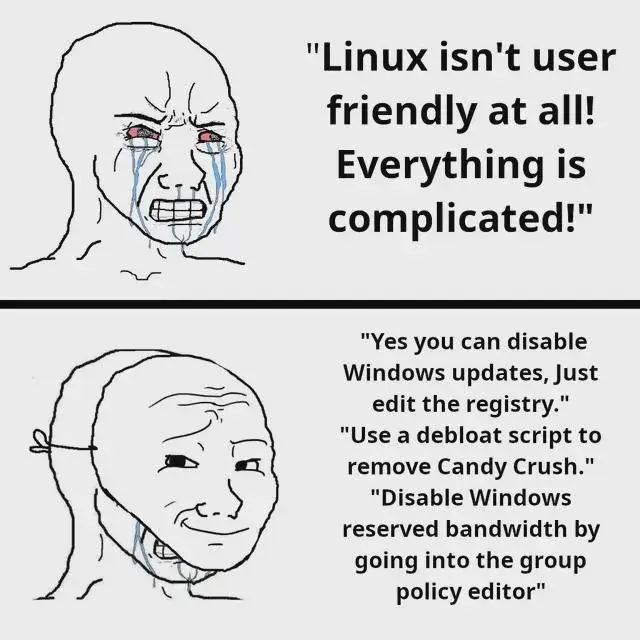this post was submitted on 07 Mar 2024
1429 points (93.1% liked)
linuxmemes
30176 readers
537 users here now
Hint: :q!
Sister communities:
Community rules (click to expand)
1. Follow the site-wide rules
- Instance-wide TOS: https://legal.lemmy.world/tos/
- Lemmy code of conduct: https://join-lemmy.org/docs/code_of_conduct.html
2. Be civil
- Understand the difference between a joke and an insult.
- Do not harrass or attack users for any reason. This includes using blanket terms, like "every user of thing".
- Don't get baited into back-and-forth insults. We are not animals.
- Leave remarks of "peasantry" to the PCMR community. If you dislike an OS/service/application, attack the thing you dislike, not the individuals who use it. Some people may not have a choice.
- Bigotry will not be tolerated.
3. Post Linux-related content
- Including Unix and BSD.
- Non-Linux content is acceptable as long as it makes a reference to Linux. For example, the poorly made mockery of
sudoin Windows. - No porn, no politics, no trolling or ragebaiting.
- Don't come looking for advice, this is not the right community.
4. No recent reposts
- Everybody uses Arch btw, can't quit Vim, <loves/tolerates/hates> systemd, and wants to interject for a moment. You can stop now.
5. 🇬🇧 Language/язык/Sprache
- This is primarily an English-speaking community. 🇬🇧🇦🇺🇺🇸
- Comments written in other languages are allowed.
- The substance of a post should be comprehensible for people who only speak English.
- Titles and post bodies written in other languages will be allowed, but only as long as the above rule is observed.
6. (NEW!) Regarding public figures
We all have our opinions, and certain public figures can be divisive. Keep in mind that this is a community for memes and light-hearted fun, not for airing grievances or leveling accusations. - Keep discussions polite and free of disparagement.
- We are never in possession of all of the facts. Defamatory comments will not be tolerated.
- Discussions that get too heated will be locked and offending comments removed.
Please report posts and comments that break these rules!
Important: never execute code or follow advice that you don't understand or can't verify, especially here. The word of the day is credibility. This is a meme community -- even the most helpful comments might just be shitposts that can damage your system. Be aware, be smart, don't remove France.
founded 2 years ago
MODERATORS
you are viewing a single comment's thread
view the rest of the comments
view the rest of the comments

Windows 7 was usable. The ten different places to hide settings started with 8 iirc. But I haven't used Windows in almost a decade, so I might be wrong.
No, you're on the money here. 7 at least had a consistent UI. It wasn't super pretty if we're all being honest with ourselves (the control panel is an ugly and clunky way of doing things compared to KDE's settings menu, for example), but it was all very functional, fairly well organized, and generally there was one setting for everything, in one place. And to be fair, KDE and Gnome were a lot clunker back then too.
The problems started with 8, because they had the idea to rework this old, ugly UI, but completely half-assed it, so rather than totally replacing every old UI element they just built new ones and ran them in parallel with the old ones, and any settings that didn't seem super important or useful to most people got ignored because hey, it's still in the old UI, people can just go there. And this problem has persisted right through into 11, albeit with gradual improvements.
My guess is, they had to run it in parallel. So many things relied on the old UI, not to mention run/cmd commands (
printui,netplwizto name a few), that simply just putting modern replacements for those things would have broken every single printer share, user credentials manager, etc., there is out there. So, they decided to run them in parallel. Smart choice if you ask me, since they own most of the desktop market share, if they decided to make a 180 turn on this, that would have cut a significant portion of their user market share... not to mention companies that heavily rely on MS products being pissed AF.They were transitioning to the new Metro look, that's why the 10 different places for the same setting.
And seeing how slowly Control Panel is being transitioned to the new Metro Settings app, I'd have to guess that that thing is so deeply intertwined in the OS and so many things rely on it, that moving to something new is painfully slow.